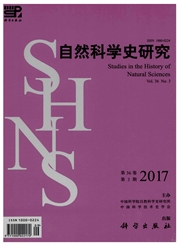

 中文摘要:
中文摘要:
坂田昌一是日本著名理论物理学家,从事原子核物理学和粒子物理学的研究。他努力推动中日科学交流,曾于1956年和1964年来华访问。坂田昌一将自己的科学工作与唯物辩证法联系起来。他提出的基本粒子由更深层次基本粒子构成的理论与毛泽东物质无限可分思想产生共鸣。这引起毛泽东重视,在中国科学界反响巨大。文章基于档案、日记、回忆录等史料,阐述坂田昌一与中国科学家和领导人的一段交往史,并展示以坂田昌一为代表的日本科学家对促进中日发展友好关系所做的贡献。这段交往史从特殊角度反映了中国科学与世界科学在特定时期进行交流和合作的一段历史。同时,也反映出科学没有国界,但科学家的交流和活动与社会、哲学、政治、外交等却是分不开的。
 英文摘要:
英文摘要:
Shoichi Sakata (1911--1970) was an eminent Japanese theoretical physicist who studied nuclear physics and particle physics. He combined his scientific research with the materialist dialectics. His theory caught Mao Zedong's attention in the 1960s. He proposed that even elementary particles were composed of constituent particles. This proposition was resonant with Mao's thought that matter could be divided infinitely. Sakata dedicated himself to pushing forward the scientific communications between China and Japan. He visited China in 1956 and 1964. Based on archives and other historical materials, this article makes a special inquiry into the relationship between Saka- ta and Chinese scientists and leaders as well as Sakata's contributions to promoting the friendship be- tween China and Japan. This period of history shows the scientific exchanges and cooperation between China and the worldwide from a specific point of view. In addition to this, it also reflects that science doesn't different from countries, but the scientific exchanges and activities are closely related to soci- ety, philosophy, politics, diplomacy, etc.
 同期刊论文项目
同期刊论文项目
 同项目期刊论文
同项目期刊论文
 期刊信息
期刊信息
